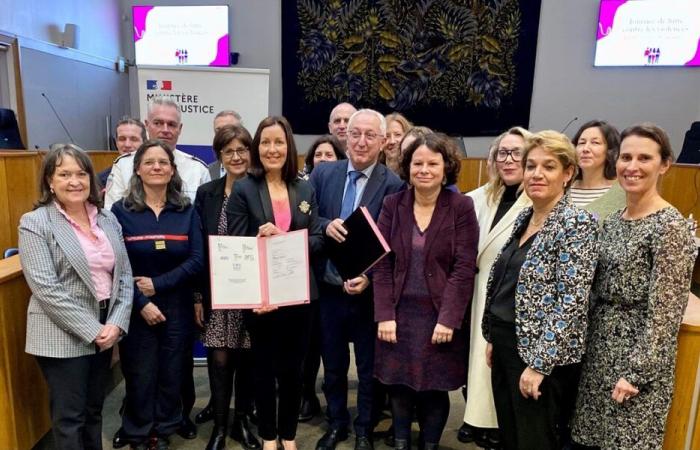
In 2022, 145 violent deaths within couples were recorded by police services and gendarmerie units compared to 143 in 2021. These statistics from the Ministry of the Interior demonstrate the extent of the phenomenon.
Faced with this observation, an experimental system was set up in 2016 in Seine-Saint-Denis, in order to coordinate the action of the various partners involved in the protection of children affected by these tragedies.
Maine-et-Loire will in turn benefit from this specific support thanks to the signing of a protocol which took place this Monday afternoon at the Angers Courthouse in the presence of Florence Dabin, President of the Department and SDIS 49, Arnaud Pouillart, Deputy Director General of the Angers University Hospital, Alexandra Verron and Éric Bouillard, Public Prosecutors at the judicial courts of Saumur and Angers, and Annyvonne Auffret, Territorial Director of the ARS Delegation of Maine-et-Loire.
This protocol aims in particular to organize the different interventions while specifying the obligations of the different actors involved, in order to allow, in an emergency, the care in a specialized hospital environment of the child present during the feminicide or the homicide of one of his parents by his partner or ex-life partner.
The ambition is to offer this young person support that is linked to their status as a victim of violence, requiring in particular time to assess the medical and social consequences caused by this tragedy within the family unit.
This protocol concerns the children present during the events, but also those absent during the act, because they are also directly impacted by the femicide or homicide.
Furthermore, this protocol provides for the benefit of minor children, a temporary placement order (OPP) for a minimum duration of 8 days, with monitoring by the child welfare services (ASE).
Hospitalization for at least 72 hours is also recommended. This will be organized within a pediatric department of the Angers University Hospital in collaboration with the team of the Pediatric Reception Unit for Children in Danger (UAPED).
In order to implement this protocol operationally, referents are designated within each partner institution.





